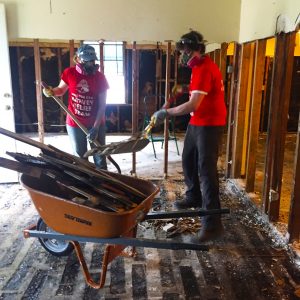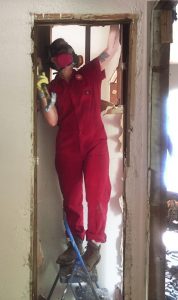Gutting Houses and Building Solidarity with Houston DSA
A sad reality of the climate crisis that has hit close to home for DSA chapters across the country is the increasingly frequent devastation caused by extreme natural disasters. Over the past two years, hurricanes Florence, Harvey, Irma, and Maria have devastated parts of the United States and Puerto Rico. In the face of these disasters, our capitalist bureaucracies have proved insufficient, but DSAers and other community members have been spurred into action in solidarity with their neighbors. — The Editors
Since August 2017 when Hurricane Harvey struck the city, the Houston DSA Harvey Relief Group (or Femme Demo Crew, a nickname stemming from the conspicuous involvement of women in the group, including the authors and then-Houston DSA co-chair Amy Zachmeyer) has been gutting homes damaged by the natural disaster.
In almost two years we have worked in over 50 homes. Often, this process only takes a day. Other times, a home requires more work. One of those homes belonged to an enthusiastic, independent retiree who had just moved into her home barely a year before our visit. Her house, though elevated, wasn’t high enough to escape the rising water from the bayou half a mile away. Between the flood waters and the mire of bureaucracy surrounding public and private charities, she and her husband were struggling to find relief.
Our crew returned to their home for several weeks in a row. We worked alongside this energetic couple, ripping out water-stained sheetrock and hauling away the warped counters in the kitchen. During breaks, we talked with them about DSA and our vision for the future and a more just society.

And they weren’t the only ones with whom we talked. So-called “natural” disasters too often fall hardest on those with the least protection, which in this case was not being on high enough ground. Ever since the project started, we’ve been having conversations with homeowners all over Houston’s northeast side. Harvey relief provided us with an entry point for these discussions because it was an opportunity to show what solidarity looks like.
Simply put, we cannot expect to organize communities that we don’t know and are not a part of. Our group of mostly white and middle-class outsiders won’t be easily trusted in working-class black and brown communities unless we show up in solidarity with them, see their .struggles firsthand, and hear what they want. Providing Harvey relief has helped Houston DSA do just that. We can’t help working class people without seeing their struggles first hand and hearing what the people in those communities want, and providing Harvey relief has helped Houston DSA do just that.
Harvey relief work isn’t just a way for Houston DSA to serve the community; it also brings our members closer together. After all, it’s hard not to learn a comrade’s name when you’re helping them roll a washing machine full of water out to the curb.Organizing around Harvey relief has also helped Houston DSA organize around housing justice, environmental justice, and criminal justice. As we like to say about Houston’s dual program: there is one body, but it has many parts.
Harvey relief work hasn’t been easy. Gutting homes is a lot of work and can be dangerous without the right equipment. Our first crews were led by licensed contractors, and throughout the project we held morning trainings before leaving the warehouse, which included time fitting protective equipment to each member of the crew. Both our volunteers and the homeowners signed waivers as well.
 Our crews never went into a home without a 3M half-face respirator equipped with P100 cartridges, the kind that can block both mold spores and odor. We would load up a truck with shovels, sledgehammers, a pike for removing wood flooring, drywall saws, power drills, push brooms, a wheelbarrow, and a dozen or so other pieces of small equipment. At the home, we would walk the place with the owner, using a rubric we learned from two members who were contractors, and help them decide what needed to go. Usually, we’d demolish and remove at least two to four feet of drywall, all porous flooring, and any wood furniture that touched the water. Doors also had to go, as they soak up flood water like sponges.
Our crews never went into a home without a 3M half-face respirator equipped with P100 cartridges, the kind that can block both mold spores and odor. We would load up a truck with shovels, sledgehammers, a pike for removing wood flooring, drywall saws, power drills, push brooms, a wheelbarrow, and a dozen or so other pieces of small equipment. At the home, we would walk the place with the owner, using a rubric we learned from two members who were contractors, and help them decide what needed to go. Usually, we’d demolish and remove at least two to four feet of drywall, all porous flooring, and any wood furniture that touched the water. Doors also had to go, as they soak up flood water like sponges.
Homeowners here still struggle to navigate through insurers and government agencies, and some may just be starting the process of proper flood mitigation now, over a year after the storm. Houston DSA will continue to work with our partners to provide unskilled labor to help them. Our efforts have slowed to once or twice a month rather than every weekend, but we are prepared to be in this effort alongside our partners and communities for the long haul.
 Democratic Socialists of America
Democratic Socialists of America